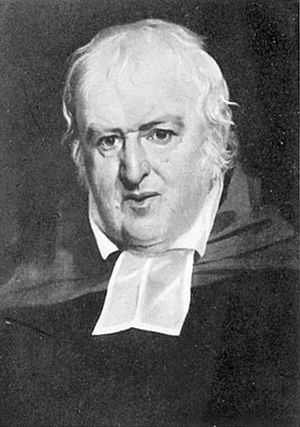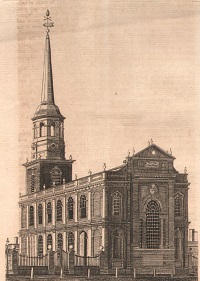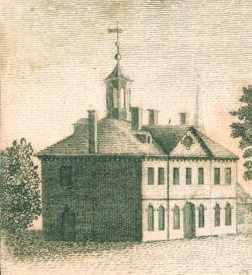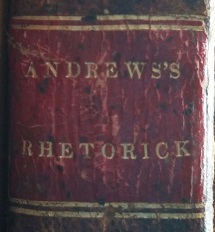John Andrews (priest) facts for kids
John Andrews (born April 4, 1746 – died March 29, 1813) was an important American Episcopal priest. He was a leader in education, serving as the 4th Provost of the University of Pennsylvania from 1810 to 1813. Before that, he was the 3rd Vice Provost and a Professor of Moral Philosophy at the same university.
Andrews also served as the Principal of the Episcopal Academy of Philadelphia. He was a church leader, a founder of the school that later became York College of Pennsylvania, and an author. He wrote textbooks and sermons that were published.
Contents
Early Life and Family History
His Childhood Years
John Andrews was born on April 4, 1746, in Cecil County, Maryland. This area is on the Eastern Shore of Maryland, near the Elk River (Maryland). His parents were Moses and Letitia Cooke Andrews. His childhood home was a 75-acre piece of land called "Lesson."
Family Background
John Andrews's family came from England. His great-great-grandfather, Edward Andrews, was a sheriff in Rutland, England, in 1637. His great-grandfather, John Andrews, moved from England to Maryland in 1654. He settled in a Puritan community called "Providence."
His Immediate Family
In 1772, John Andrews married Elizabeth Callender. She was the daughter of Captain Robert Callender, who fought in the American Revolution. John and Elizabeth had ten children together. Their eldest son, Robert, graduated from the Academy and College of Philadelphia in 1790. Elizabeth Andrews passed away on February 22, 1798.
Education and Ministry Training
When John Andrews was seven, his father sent him to the Head of Elk School in Elkton, Maryland. He later attended The Academy and College of Philadelphia. In 1764, he earned his A.B. degree with high honors. After graduating, he taught grammar school in Philadelphia.
In 1767, Andrews earned his M.A. degree from the College of Philadelphia. This college later became part of the University of Pennsylvania. He continued teaching at a classical school in Lancaster, Pennsylvania. Andrews decided he wanted to become a minister in the Episcopal Church. He studied theology with Rev. Thomas Barton in Lancaster.
After his studies, Andrews traveled to London, England. There, he was ordained as a Deacon in the Anglican Church. He was then sent as a Missionary to Lewes, Delaware.
Career and Contributions
Early Church Service
From 1767 to 1770, Rev. John Andrews served at St. Peter's Episcopal Church (Lewes, Delaware). He then moved to York, Pennsylvania. There, he became a missionary for St. John's Church in York and St. John's Church in Carlisle, Pennsylvania. Around 1775, he also took charge of St. John's Church in Queen Anne's County, Maryland.
During the American Revolution
As the American Revolutionary War began, Andrews faced a difficult choice. He supported the American cause, but he had taken an oath of loyalty to England when he became a minister. Because of this, he decided to stop his public church duties for a time. He returned to York during the war.
Founding York College
In 1776, while in York, Andrews started an academy. This school grew and changed over time. Today, it is known as York College of Pennsylvania. In 1787, it officially became the York County Academy.
After the War
After the American Revolution ended, Andrews went back to his church work. In 1782, he became the rector of St. Thomas Church in Baltimore County, Maryland. He held this position until 1784. That same year, he helped organize the separation of the American Episcopal Church from the Anglican Church. He also supported the idea of uniting with the Methodist Church.
Leadership in Education
In 1785, Washington College in Chestertown, Maryland, gave Andrews an honorary Doctor of Divinity degree. That same year, the Episcopal Academy was founded in Philadelphia. Andrews was chosen to be its headmaster. He served there until 1789.
In 1789, he became a Professor of Moral Philosophy at the University of Pennsylvania. At Penn, he taught about the Constitution of the United States. He became the Vice-Provost of the University of Pennsylvania from 1789 to 1810. Then, he served as the Provost from 1810 until his death on March 29, 1813.
Until his death, he also served as the Rector of St. James Church in Bristol, Pennsylvania. He was also an assistant minister at Christ Church in Philadelphia. John Andrews is remembered as one of America's first great scholars. He dedicated his life to learning, teaching, and leading schools and colleges.
In 1787, he was elected as a member of the American Philosophical Society. John Andrews is buried at the historic Christ Church Burial Ground in Philadelphia.
Published Works
Textbooks He Wrote
- A Compend of Logick (1801)
- Metamorphoseon (1805)
- Elements of Logic (second edition 1807)
- Elements of Rhetorick and Belles Lettres (1813)
Sermons He Published
- A Sermon on the Importance of Mutual Kindness (1789)
- A Sermon on the Parable of the Unjust Steward (1789)
Addresses He Gave
- An Address to Graduates in Medicine, Delivered at Commencement of University of Pennsylvania in 1791
 | John T. Biggers |
 | Thomas Blackshear |
 | Mark Bradford |
 | Beverly Buchanan |





